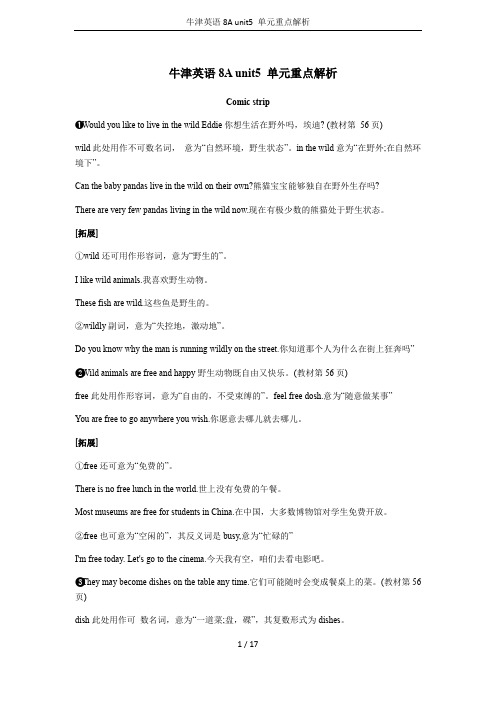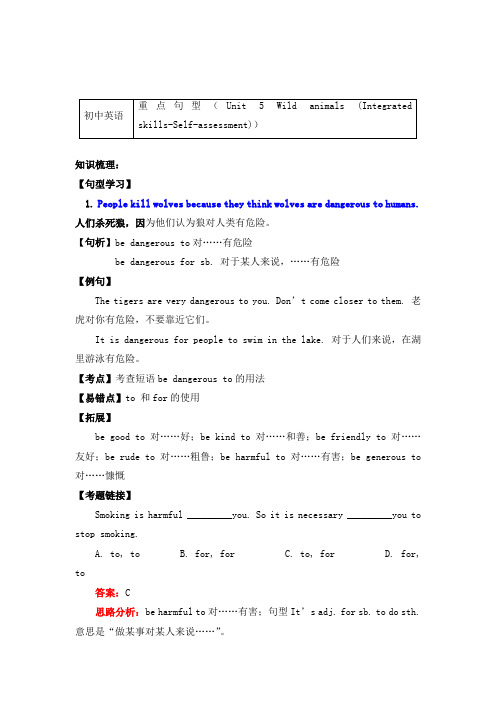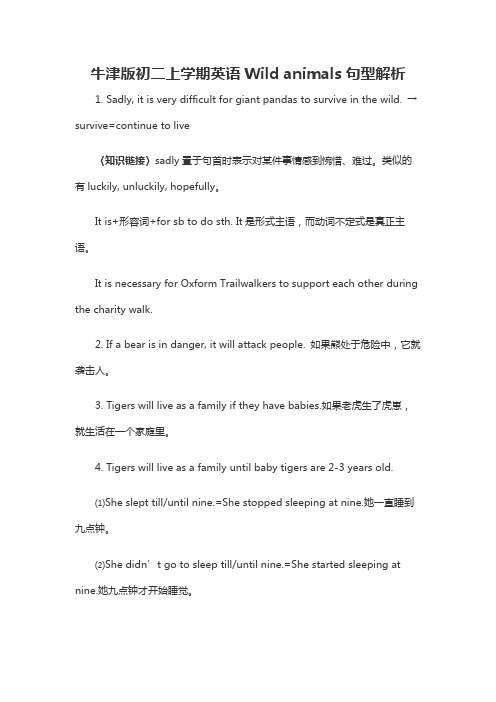牛津版初二上学期英语Wildanimals句型解析
- 格式:doc
- 大小:27.00 KB
- 文档页数:4

牛津译林英语8A Unit 5 Wild animals短语句型语法复习提纲一、重要词组1 不可能/没问题 no way / no problem2 采取行动take action3 同情,怜悯 have / take pity on4 实际上,事实上in fact5 大熊猫giant panda6 出生,出世 be born7 出生时,诞生时at birth8 一开始,起初at / in the beginning / at first9 在…开始时at the beginning of …10 最后,终于 in the end / at last / finally11 在…的末端,在…结束时at the end of …12 以食…为生,靠…生活live on …13 因此as a result14 处境危险/ 脱离危险in danger / out of danger15 整个冬天through the winter16 立刻,马上 right away / at once17 迷路get lost / lose one’s way18 与…同样the same … as …19 你的真诚的 yours sincerely20 在白天in the daytime21 在四个月大时at four months old22 砍倒cut down23 失去居住地 lose living areas24 作为一个团队而工作/成群地活动work as a team25 面临严重的问题face serious problems26 动物世界之王the king of the animal world27 …的故事the story of …28 学会照料自己learn to look after oneself29 解决,解出 work out30 在它们的一生中during their lives31 制定法律保护熊猫make laws to protect pandas32 跳来跳去jump around33 走近,靠近go near …34 在…的帮助下with the help of … / with one’s help35 闹着玩儿地 for fun36 对人来说是危险的be dangerous to humans37 多可恶啊!/ 真可惜!What a shame! / What a pity!38 听到这个我很难过。

牛津英语8A unit5 单元重点解析Comic strip➊Would you like to live in the wild Eddie你想生活在野外吗,埃迪? (教材第56页)wild此处用作不可数名词,意为“自然环境,野生状态”。
in the wild意为“在野外;在自然环境下”。
Can the baby pandas live in the wild on their own?熊猫宝宝能够独自在野外生存吗?There are very few pandas living in the wild now.现在有极少数的熊猫处于野生状态。
[拓展]①wild还可用作形容词,意为“野生的”。
I like wild animals.我喜欢野生动物。
These fish are wild.这些鱼是野生的。
②wildly副词,意为“失控地,激动地”。
Do you know why the man is running wildly on the street.你知道那个人为什么在街上狂奔吗”❷Wild animals are free and happy野生动物既自由又快乐。
(教材第56页)free此处用作形容词,意为“自由的,不受束缚的”。
feel free dosh.意为“随意做某事”You are free to go anywhere you wish.你愿意去哪儿就去哪儿。
[拓展]①free还可意为“免费的”。
There is no free lunch in the world.世上没有免费的午餐。
Most museums are free for students in China.在中国,大多数博物馆对学生免费开放。
②free也可意为“空闲的”,其反义词是busy,意为“忙碌的”I'm free today. Let's go to the cinema.今天我有空,咱们去看电影吧。

Unit 5 Wild Animals一、重点单词1.free 自由的adj.,freedom 自由n.2.have /take pity on sb. 同情某人We should have pity on the weak. 对病人,我们应该要有同情心。
3.(die死,v. ) (dying垂死的,adj.) (dead,死的,adj.) (death,死,n.)4.be born 出生I was born in 1976. 我出生于1976年。
5.in the beginning,at the beginning, 一开始6. live on 以食...为生,V ampires live on blood.吸血鬼以吸血为生。
7.(danger 危险n.)(dangerous 危险的,adj.)in danger 处境危险8.action 行为,行动,n. take action 采取行动9.right away 立刻,at once 马上10. none 没有一个(人或物)否定回答,表示什么也没有11.at birth 出生时,诞生时12.get lost 迷路at a lose 迷茫13.the same ...as 与... 一样She has the same book as you.二、重点句型1.When Xi Wang was born, she weighed just 100 grams and looked like a white mouse.2. It is very difficult for pandas to have babies.3. However, the bamboo forests are becoming smaller and smaller.4.Giant pandas are now in danger. We should take action right away.5.If we do nothing soon there may be none left! However, we do believe that where there is Xi Wang, there is hope.6.We shouldn’t buy fur coats any more.三、重点语法1.情态动词may的用法用来猜测某件事件发生的可能性,表示“也许”,“可能”Who is knocking on the door? It may be Helen.May 表示“可能”,通常只用于肯定句和否定句2.动词不定式作宾语to do 形式I want to eat ice ream.My sister decides to buy a new bike.这一类常见动词:agree(同意),choose(选择)decide(决定)forget(忘记)hope(希望)learn(学习)like(喜欢)plan(计划)prepare(准备)promise(答应)refuse(拒绝)remember (记得)seem(觉得好像)want(想要)wish(希望)would like (想要)Unit 5 Wild Animals 单元测试I.根据句意及首字母补全下列单词,使句子完整(10分)1.The food s good but tastes terrible.2.Look !Many f are still working in the field though(虽然)it is raining.3.I like travelling by train,it's s and cheap.4.After you finish the trip to Beijing,write an English r .5.Protecting f means giving wild animals lots of place to live in.6.When autumn is coming, 1 turn yellow and fall down.7.Some s are poisonous so we had better not be close to them.8.If you often t dogs,they can do many things for you.9.The Chinese government is taking many actions to p all kinds of wild animals.10.When we have trouble in learning English,our teacher always e us to do it well.Ⅱ.单项选择(15分)( )1.一Who is Lily______ over there?一Her English teacher.A.talk at B.talking at C.talk to D.talking to( )2.If my parents ________free tomorrow,we for a picnic.A.are;go B.are;will go C.will be;will go D.will be;go( )3.My mother is ill and I have to stay at home and _______her.A.1ook for B.1ook after C.1ook at D.1ook like( )4.It's difficult _____us_______ English well.A.to;to learn B.for;for learning C.to;to learning D.for;to learn( )5.We should encourage the children ________hard.A.work B.working C.to work D.worked( )6.If a bear is_________ ,it ________people.A.in dangerous;attacks B.in danger;attacksC.in danger;attack D.in dangerous:attack( )7.The panda started ________outside her home when she was four months old.A.to go B.going C.go D.goes( )8.The number of wild animals is smaller and smaller.We must help ________them .Hunters shouldn't_________ them.A.survived;killed B.survive;killC.to survive;to kill D.survive;killing( )9.If we don't _________,there will be no bears in the world.A.take some action B.take any actionC.to take any action D.take some actions( )10.There are more than __________in the concert.A.five thousands students B.five thousand studentC.five thousand students D.five thousands studentⅢ.根据汉语意思完成下列句子, 每空一词(15分)1.你的食物看起来很美味。

知识梳理:【句型学习】1. People kill wolves because they think wolves are dangerous to humans.人们杀死狼,因为他们认为狼对人类有危险。
【句析】be dangerous to对……有危险be dangerous for sb. 对于某人来说,……有危险【例句】The tigers are very dangerous to you. Don’t come closer to them. 老虎对你有危险,不要靠近它们。
It is dangerous for people to swim in the lake. 对于人们来说,在湖里游泳有危险。
【考点】考查短语be dangerous to的用法【易错点】to 和for的使用【拓展】be good to 对……好;be kind to 对……和善;be friendly to对……友好;be rude to 对……粗鲁;be harmful to对……有害;be generous to 对……慷慨【考题链接】Smoking is harmful _________you. So it is necessary _________you to stop smoking.A. to, toB. for, forC. to, forD. for, to答案:C思路分析:be harmful to对……有害;句型It’s adj. for sb. to do sth.意思是“做某事对某人来说……”。
2. Sadly, they have fewer and fewer living areas.令人伤心的是,它们生活的区域越来越少。
【句析】这里的fewer and fewer是形容词比较级的并列连接,表示“越来越……”【例句】There are fewer and fewer tigers in the world.=The number of tigers in the world is becoming smaller and smaller.世界上老虎的数量越来越少。

牛津版初二上学期英语Wild animals句型解析1. Sadly, it is very difficult for giant pandas to survive in the wild. →survive=continue to live〈知识链接〉sadly置于句首时表示对某件事情感到惋惜、难过。
类似的有luckily, unluckily, hopefully。
It is+形容词+for sb to do sth. It是形式主语,而动词不定式是真正主语。
It is necessary for Oxform Trailwalkers to support each other during the charity walk.2. If a bear is in danger, it will attack people. 如果熊处于危险中,它就袭击人。
3. Tigers will live as a family if they have babies.如果老虎生了虎崽,就生活在一个家庭里。
4. Tigers will live as a family until baby tigers are 2-3 years old.⑴She slept till/until nine.=She stopped sleeping at nine.她一直睡到九点钟。
⑵She didn’t go to sleep till/until nine.=She started sleeping at nine.她九点钟才开始睡觉。
till/until直到…时为止,not…until…直到…才…,till/until后接短语或从句。
till/until用在肯定句中时通常表示动作的终点,用在否定句中时则表示动作的起点。
They talked until dawn.They did not return home until 10:00.③I didn’t know it until you told me. His uncle didn’t get married until he was 35.④—Was his father very strict with him?—Yes. He had never praised him until he became one of the top students in his grade.They the train until it disappeared in the distance.A. sawB. watchedC. noticedD. looked at〈知识链接〉当until从句与肯定的主句连用时,主句的谓语动词必须是延续性动词;与否定的主句连用时,主句的谓语动词必须是非延续性动词。

八年级英语上册unit5单元知识点总结教学目标:本单元重要知识点讲解1. Why not? Wild animals are free and happy.(1) Why not?表示赞同别人的建议,相当于Good idea! I think so.等。
(2) free意为“免费的;自由的”。
作“自由的”讲时,-- freer--freest,其反义词是busy; be busy doing sth. 作“免费的”讲时,没有比较级和最高级形式,常用短语为for free(免费地)。
be free to do sth.意为“自由地做某事”。
如:You are free to go or stay.(3) wild作名词,“野生状态in the wild “在自然环境下;在野外”。
wild作形容词,“野生的”,一般作定语修饰名词;也可跟在连系动词后面作表语。
We shouldn't hunt wild animals for food.These roses are wild。
2.So could you please not eat them?Can/Could/would you please + 动词原形.?“请你……,好吗?”。
其否定式是在please后直接加not。
Could you please not park your car here?3.Please have pity on them,Eddie.have pity on sb. “同情某人”。
pity是不可数名词,意为“同情”。
pity作“遗憾,可惜”讲时,是可数名词。
I have pity on you but I can't help you this time.What a pity! 这真是遗憾呀!4. die vi.死→dead adj.死的→*dying adj.快死的→death n死。
die of与die from的区别:die of指死于疾病、衰老等自身的原因;die from指死于地震、交通事故、雷击等外部原因;死于饮酒、受伤、劳累过度、饥饿、饥寒等两者皆可。
8A Unit 5 Wild animals语法知识点讲解课文重点内容和语法知识1 about some wild animals 关于一些野生动物2 to use the new words to talk about a wild animal 使用新单词来谈论野生动物3 to use may for possibility 使用may来谈论可能性;to use verbs+to-infinitives 使用动词+不定式to4 the suffixes –ing, -ness, and –ion 后缀-ing,-ness,和-ion一、【重点短语】1. in the wild 在野外2. have/take pity on 同情,怜悯3. in fact 事实上4. look so cute 看起来如此可爱5. be born 出生,出世6. look like 看起来像7. at four months old 在4个月的时候8. not…any more 不再……9. in the beginning 一开始10. look after 照顾照看11. as a result 因此12. in danger 处于危险中13. take action 采取行动14. right away 马上,立刻15. build more panda reserves 建立更多的熊猫保护区16. make laws to protect pandas 颁布法律保护熊猫17. at birth 出生时诞生时三、【重点句型】1. They turned around but saw nothing.她们转过身去,可什么也没看到。
(1) turn around转身Jim turned around and saw his parents standing behind him. 吉姆转过身去,发现他的父母在他的身后。
Unit 5一、重点词组:1.live in the wild 生活在野外2.any time 任何时候;随时3.become dishes on the table 成为餐桌美味4.have /take pity on them 同情他们5.in fact 事实上,实际上6.the king of the animal world 动物世界之王7.look cute = look lovely 看起来可爱8.like… best/most ; like … least 最喜欢…… / 最不喜欢……9.be born 出生10.look like a white mouse 看起来像个白鼠11.at four months old 在四个月大时12.eight months later= after eight months 八个月之后13.go outside for the first time 第一次外出14.in/at the beginning=at first 一开始15.not… any more = no more 不再16.learn to look after oneself 学习自我照顾17.face serious problems 面对严重的问题18.live mainly on…= mainly live on…主要以食…..为生19.a special kind of bamboo 一种特殊的竹子20.become smaller and smaller 变的越来越少21.as a result 结果22.be in danger 处于危险之中23.take action /act to protect wild animals 采取行动来保护野生动物24.right away/now=at once 立刻,马上25.build more panda reserves 建更多的保护区26.make laws to protect pandas 制定法律来保护熊猫27.need to do something for giant pandas 需要为大熊猫做些事情28.at birth =when sb. was born. 出生时29.get sick 生病30.be important to sb. 对某人重要31.go /walk towards…朝….. 走去32.be afraid of sb. /sth. //doing sth. 害怕某人 /某物 / 做某事33.jump around 跳来跳去34.play with each other 互相玩乐35.stand with its eyes close d 闭着它的眼站着36.something special / something else 特殊的东西 / 别的东西37.for example 例如38.work out easy maths problems 做出简单的数学题39.the same size /colour / height/ weight as…和….. 尺寸 / 颜色 / 高度 / 重量一样40.with the help of…在……的帮助下41.with one’s help / without one’s help 在某人的帮助下 / 没有某人的帮助42.get lost =lose one way 迷路43.begin to save food 开始储存食物44.forget where to find the food 忘记在哪里找到食物45.live alone= live by oneself= live on one’s own 独居46.orange fur with dark stripes 带深色条纹的橘黄色毛皮47.run for a short while 跑一小会儿48.catch.. for... / kill… for… / hunt … for…为了….. 而捕获 / 杀死 / 猎杀……49.other parts of the body 身体的其他部位50.thick fur 厚皮毛51.buy fur coats=buy coats made of animal s’fur 买皮毛(动物皮毛做的)大衣52.see, hear and smell things far away 看见,听见,闻到很远的东西53.work as a team 团队合作54.kill for fun 杀生取乐55.run for hours without stopping 跑数小时而不停止56.be dange rous to humans 对人类危险57.some of them / all of them /none of them / most of them / one of them58.lose one life / lives 失去生命59.lose living areas 失去生活区域60.because of… (because of hunting ; because of the heavy rain…) 由于……61.need our protection 需要我们的保护62.have feeling of happiness and sadness 有高兴和悲伤的感觉63.accept my invitation (write an invitation letter) 接受我的邀请(写一封邀请信)64.move around slowly 慢慢地到处游荡65.in the daytime / at night 在白天 / 在夜晚66.sleep through the winter 在整个冬天冬眠67.seldom hurt people 很少伤人二、重点句子:1. I don’t think wild animals are free and happy in the wild.我认为野生动物在野外不自由开心。
Unit 5 Wild animalsComic strip—Welcome to the unit1.Would you like to live in the wild Eddiewild 用作不可数名词,“自然环境,野生状态”。
in the wild “在野外;在自然环境下”。
例句:Can the baby lion live in the wild on their own?There are very few pandas living in the wild now.[拓展]①wild还可用作形容词,意为“野生的”。
I like wild animals.These chicken are wild.②wildly副词,意为“失控地,激动地”。
Do you know why the woman is running wildly on the street.2.Wild animals are free and happyfree adj.意为“自由的,不受束缚的”。
You are free to go anywhere扩展—一词多义①(adj.) 自由的,不受束缚的②(adj.) 有空的,空闲的③(adj.) 免费的例句:There is no free lunch in the world.I'm free today. Let's have a picnic.3.They may become dishes on the table any time.dish 可数名词,意思: 一道菜,或者盘子、碟子。
其复数形式为dishes。
例句:Help yourself to the dishes.The dish is very beautiful.4.So could you please not eat them?(1)Could you please + do ?意为“请你....好吗?”,其否定形式为“Could you please + not +do?”,意为“请你不要好吗?”,它们都是表示委婉清求的句型。
8A Unit5 Wild animals 重点短语与句型小结默写卷1.野生动物_________________2.居住在野外_________________3.事实上_________________4.处于危险中_________________5.写报告_________________6.灭绝_________________7.年轻的时候_________________8.大熊猫_________________9.出生于_________________10.一开始_________________11.面临困难_________________12.严重的局面_________________13.作为结果_________________14.采取行动_________________15.保护野生动物_________________16.自然保护区_________________17.立刻_________________18.立法_________________19.出生时_________________20.和……一样_________________21.和……不同_________________22.搜寻_________________23.因……杀害…… _________________24.在白天_________________25.以……为食_________________26.当希望出生时,她仅有100g重,并且看起来像一只白老鼠。
________________________________________________________ 27.当她20个月大的时候,她学习照顾自己。
________________________________________________________ 28.忧伤的是,大熊猫在野外面临着严重的问题。
牛津版初二上学期英语Wildanimals句型解
析
1. Sadly, it is very difficult for giant pandas to survive in the wild. rarr; survive=continue to live 〈知识链接〉sadly置于句首时表示对某件事情感到惋惜、难过。
类似的有luckily, unluckily, hopefully。
It is+形容词+for sb to do sth. It是形式主语,而动词不定式是真正主语。
It is necessary for Oxform Trailwalkers to support each other during the charity walk.
2. If a bear is in danger, it will attack people. 如果熊处于危险中,它就袭击人。
3. Tigers will live as a family if they have babies.如果老虎生了虎崽,就生活在一个家庭里。
4. Tigers will live as a family until baby tigers are 2-3 years old.
⑴She slept till/until nine.=She stopped sleeping at nine.她一直睡到九点钟。
⑵She didnt go to sleep till/until nine.=She started sleeping at nine.她九点钟才开始睡觉。
till/until直到时为止,notuntil直到才,
till/until后接短语或从句。
till/until用在肯定句中时通常表示动作的终点,用在否定句中时则表示动作的起点。
They talked until dawn.
They did not return home until 10:00.
③I didnt know it until you told me. His uncle didnt get married until he was 35.
④-Was his father very strict with him?
-Yes. He had never praised him until he became one of the top students in his grade.
They the train until it disappeared in the distance.
A. saw
B. watched
C. noticed
D. looked at
〈知识链接〉当until从句与肯定的主句连用时,主句的谓语动词必须是延续性动词;与否定的主句连用时,主句的谓语动词必须是非延续性动词。
Dont get off until it has stopped.
5. They looked lovely on me.=I looked lovely in them. 注意介词on/in的使用 (p69)
〈知识链接〉Sth look lovely on sb.=Sb look lovely in sth.某物穿/戴在某人身上很漂亮。
6. If no one buys furs, then people wont kill wild animals any more.
〈知识链接〉furs毛皮制品(可数名词),fur毛皮(不可数名词),如:animal fur兽皮
7. The number is getting smaller and smaller because many of their living areas are becoming farmland.
因为它们的许多生存地逐渐变成农田,它们的数量变得越来越少。
(p71)
〈知识链接〉the number of+名词复数,“的数量/数目”,the number是中心词,而of短语是对它的限制,因此其谓语动词必须用单数。
当表示“多”、“少”时用large/big和small。
a number of+名词复数,表示“许多、若干”=many, a lot of。
a number of并不是中心词,而是不定数量词,如同a lot of, lots of, many, some。
因此,
a number of+名词复数作主语时,其谓语动词用复数。
①The number of people invited was 60, but a number of them were absent for different reasons.
②There were a large number of people in the hall.
③A number of people have applied for the job.
④Chinese is spoken by the largest number of people in the world. 世界上说汉语的人最多。
⑤The number of the students in our class is
70.=There are 70 students in our class.
⑥The number of Chinese is much larger than that of Great Britain.
8. If I arrive at noon, I will see the feeding of animals. (p65)
〈知识链接〉at noon=at twelve oclock在正午,in the middle of the day在中午
每一单元结束之后大家一定要对其中重要内容进行
掌握,平时的积累才能让我们在考试中更好的发挥,初二上学期英语Wildanimals句型解析不知道大家掌握了没?更多热点内容请点击牛津版八年级上册英语Wildanimals重点单词!。